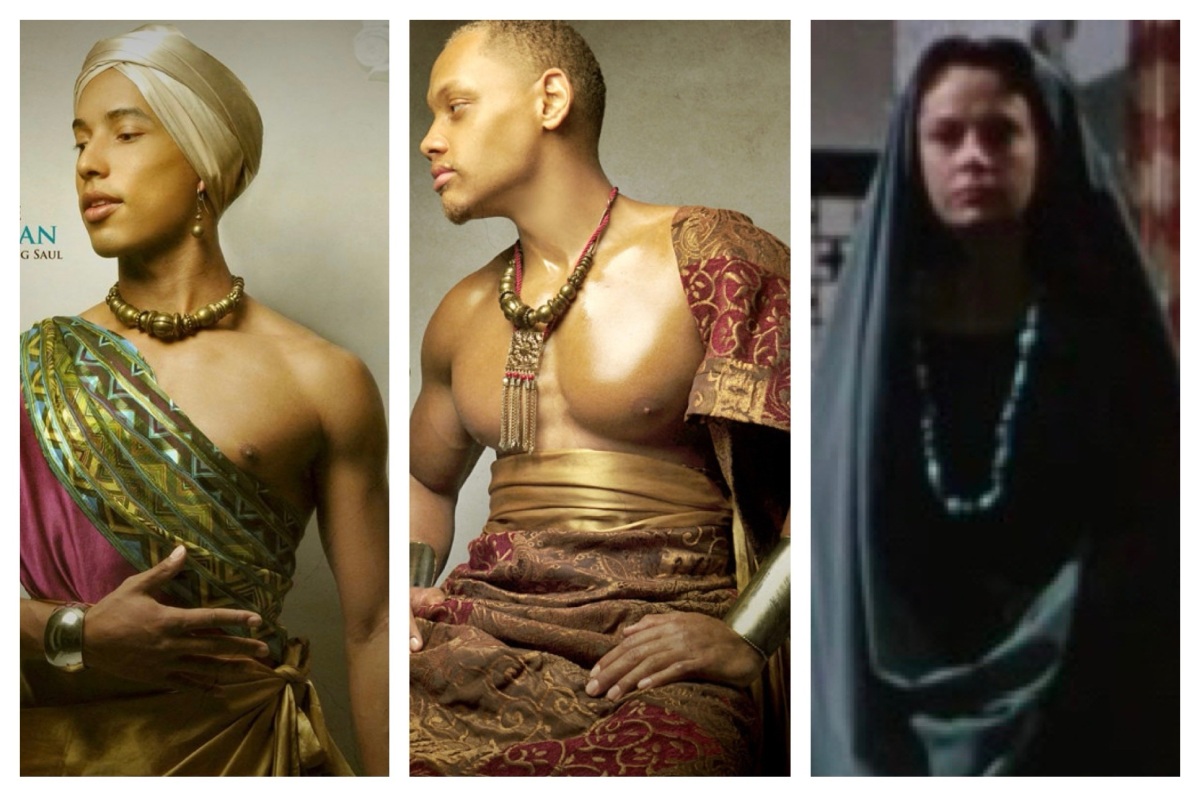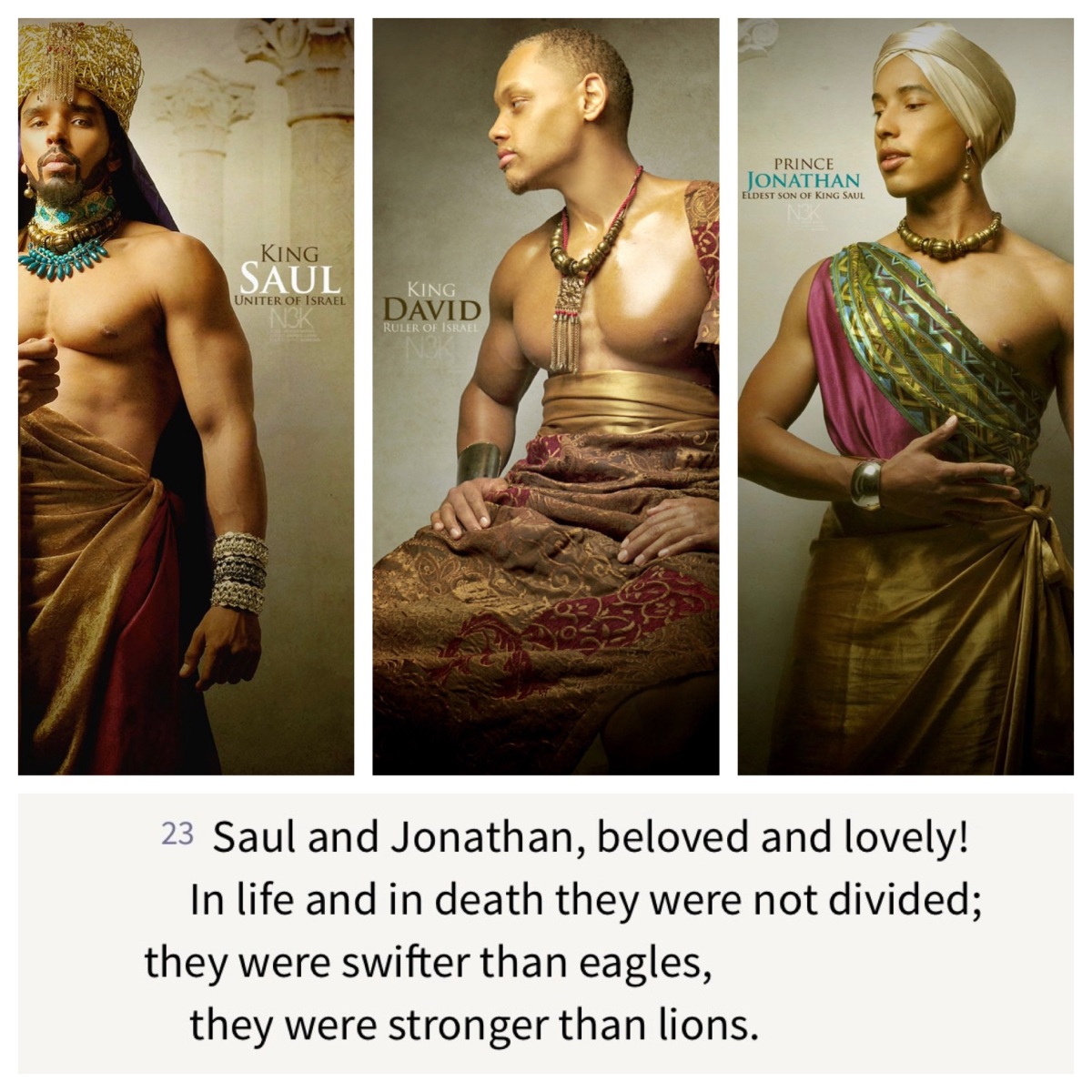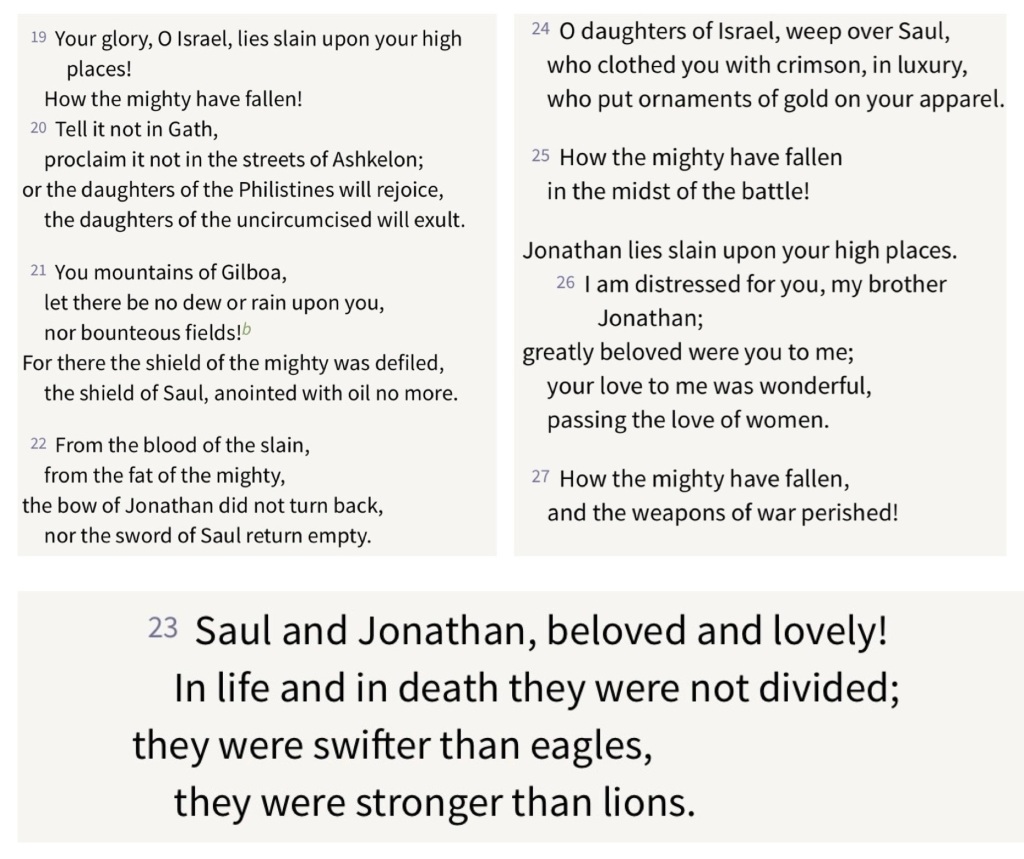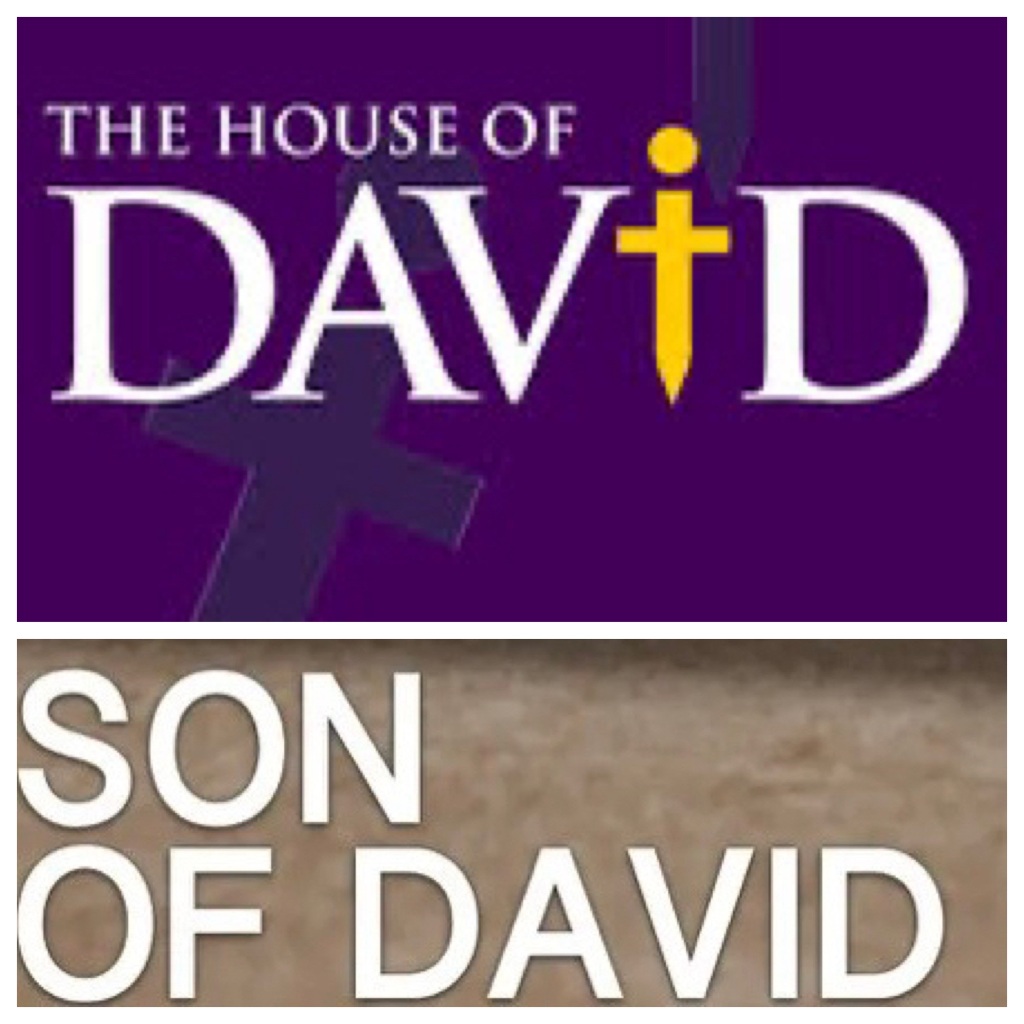In the days leading up to this Sunday, we are thinking of the lament which opens the book we know as 2 Samuel, where David sings of his love for both King Saul and his son Jonathan (2 Sam 1:1, 17–27). As the lectionary has jumped from the rollicking yarn of how David killed Goliath (1 Sam 17), to this sorrowful lament that David sings (2 Sam 1), it has leapt over some important stories.

We have had little opportunity to consider Jonathan, who had been in an intense and intimate relationship with David; he features in the battles of 1 Sam 13—14, but the lectionary has omitted all of these scenes. Nor have we had opportunity to consider Michal, the sister of Jonathan, who was married to David as his first wife—of eight: for after her came Ahinoam the Yizre’elite; Abigail, the widow of Nabal the Carmelite; Maacah, the daughter of Talmay, king of Geshur; Haggith; Abigail; and Eglah.
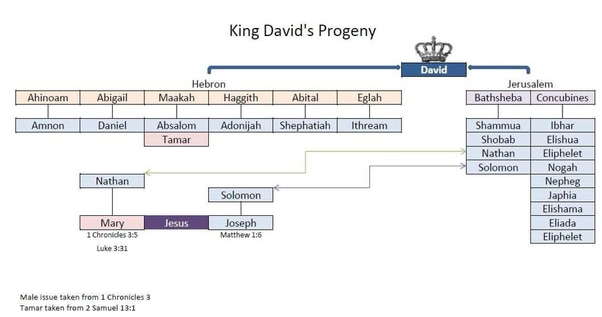
A list in 1 Chron 3:1–8 identifies eighteen of David’s sons, before concluding “these were David’s sons, besides the sons of the concubines”, and then adding the tag- line, “and Tamar was their sister” (1 Chron 3:9).
David’s relationship with Jonathan was, as we have seen, intense and intimate: “the soul of Jonathan was bound to the soul of David, and Jonathan loved him as his own soul. Saul took him that day and would not let him return to his father’s house. Then Jonathan made a covenant with David, because he loved him as his own soul.” (1 Sam 18:1–3).
The verb used here is אָהַב (ahab), the same used throughout the ancestral narratives for the love of a man for a woman (Gen 24:67; 25:28; 29:18, 20, 30, 32; 34:3; Judg 16:4; 1 Sam 1:5; 2 Sam 13:1, 4, 15; 1 Ki 11:1; 2 Chron 11:21). It is also used for God’s love for Israel (Deut 7:8; 1 Ki 10,9; 2 Chron 2:11; 9:8)—and, of course, God is understood as the husband (masculine) of Israel (feminine) (Hos 2:16; Isa 54:5–7; Jer 31:32; Ezek 16:8–14; and see Eph 5:31–32; Rev 21:2).
David’s relationship with Michal comes after her father, Saul, had offered David his daughter Merab as his wife—an offer which David politely declined (1 Sam 18:17–19). The first we know of Michal is the stark comment, “Saul’s daughter Michal loved David” (18:20, repeated at v.28). The verb used is אָהַב (ahab), the same used of David’s love for Jonathan (1 Sam 20:17; 2 Sam 1:16). Michal’s love for David had the same quality, the same character, as Jonathan’s love for David, and David’s love for Jonathan.
Perhaps we might reflect more on what David says when he compares Jonathan’s love for him with the love of women for him (2 Sam 1:26). Remember, he had no less than eight wives, who bore him at least nineteen children! So David knew a lot, we might assume about “the love of women”.
In his lament, David remembers that Jonathan’s love for him was “wonderful” (2 Sam 1:27). This is one possible translation of the word used here, פָלָא (pala), which has the sense of something extraordinary, something surpassing normal phenomena. It is used on occasion to refer to the miraculous “signs” that God performed in redeeming Israel from slavery in Egypt (Exod 3:20; Judg 6:13; 1 Chron 16:9–12; Neh 9:17) and that are promised to Israel in future years (Exod 34:10; Josh 3:5). David’s praise for Jonathan’s love is high indeed!

It is worth pondering these two forms of love that revolve around David in the early stages of his kingship. My wife, Elizabeth Raine, has undertaken a careful analysis of how these two relationships are described, and has noted a striking set of comparisons that are drawn between the way that David experienced his living relationship with Jonathan, and his relationship with his first wife, Michal.
David had married Michal (1 Sam 18:20–27) soon after he had entered into the covenant with Jonathan (1 Sam 18:3–5). Michal and Jonathan are both children of Saul, but they show more loyalty to Saul’s competitor (David) than to Saul. Their stories are told side-by-side side in 1 Samuel 18—20. What follows is Elizabeth’s analysis.
When we make careful comparisons, the results are surprising: traditional Hebrew male traits are attached to Michal, the female; whilst traditional Hebrew feminine traits are linked with Jonathan, the male. David relates to Michal as a man relates to a man, whilst David relates to Jonathan as a man relates to a woman.
David and Michal
We are told that Michal loved David and made it known (1 Sam 18:20, 18:28). This is the only time in 1—2 Samuel when a woman chooses her husband; usually the man chooses his wife. We note that it is never said that David married Michal for love, unlike the feelings that he appears to have had for Bathsheba (2 Sam 12:24; so also at the end of his life, in 1 Ki 1–2). Rather, David marries Michal for political reasons; he wants to be the son-in-law of King Saul.
Michal’s masculinity is contrasted with effeminate nature of her husband, Paltiel, who runs along crying when David forcibly reclaims Michal (2 Sam 3:16). Michal’s masculine traits are on show when she takes assertive physical action, unlike the typical Hebrew female (with just a few exceptions, like Jael and Deborah). First, Michal saves David by physically lowering him out a window (1 Sam 19:12). Then, she arranges her bed to make it appear that David is there (1 Sam 19:13), she lies to messengers, and then she lies to Saul (1 Sam 19:14–15).
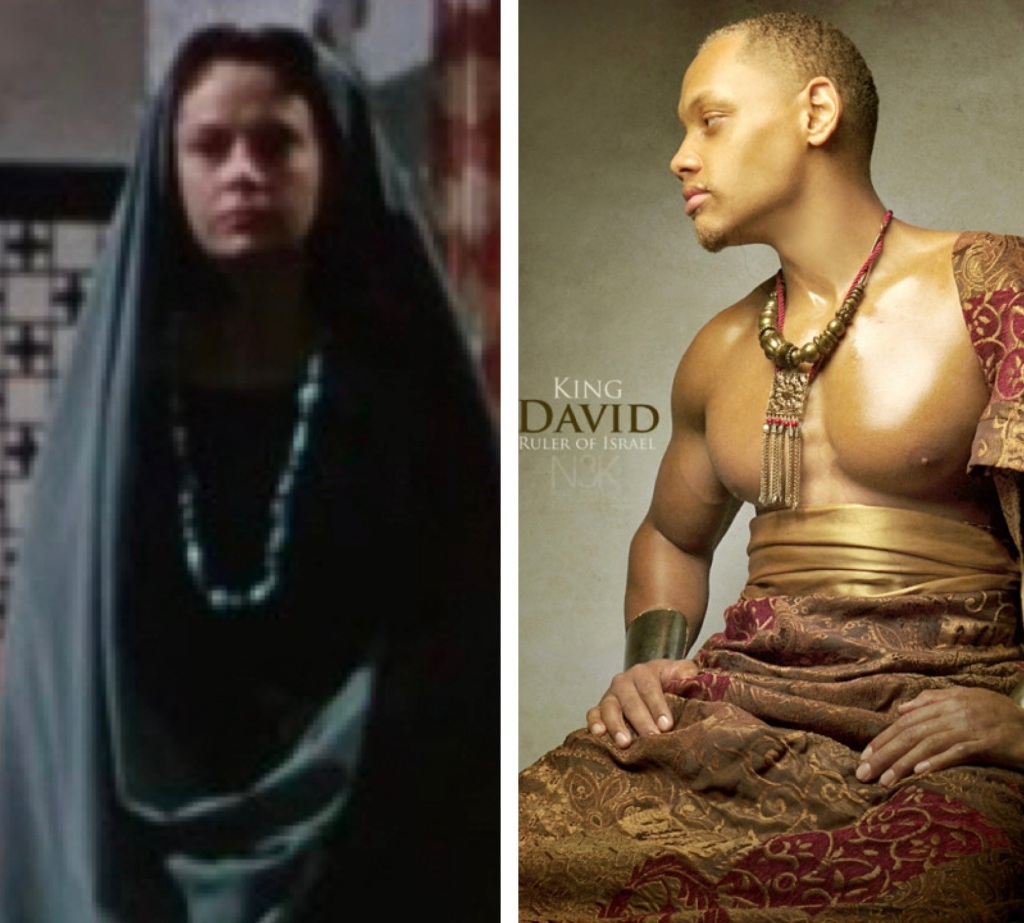
Finally, Michal never bore a child to David; she does not fulfil the primary female role for women. And Michal is never described as beautiful, as other biblical women are: Abigail (1 Sam 25:3), Bathsheba (2 Sam 11:2), Tamar (2 Sam 13:1; 14:27), the queen of Ophir (Ps 45:11), and Esther (Esther 2:7)—and, over and over, the woman, “black and beautiful”, of the Song of Solomon.
Thus, Michal is cast in a most unfeminine role.
David and Jonathan
By contrast, David’s love and tenderness are reserved for Jonathan (2 Sam 1:26). On a number of occasions, as we have noted, Jonathan makes known his warm feelings for David (1 Sam 18:1; 19:1; 20:17). When Jonathan declares his feelings for David, David meets him and reciprocates with extravagant actions: “he prostrated himself with his face to the ground, bowed three times, and they kissed each other, and wept with each other; David wept the more” (1 Sam 20:41).
David and Jonathan kissed and wept with intensity until David ends their encounter with words pregnant with meaning: “the Lord shall be between me and you, and between my descendants and your descendants, forever” (1 Sam 20:42). These words evoke the covenantal commitment made by Jacob with Laban at Galeed—the Mizpah blessing, “the Lord watch between you and me, when we are absent one from the other” (Gen 31:49). The intensity of David’s covenantal promise is unparalleled elsewhere in the Hebrew Bible.

The narrative is clear that Jonathan assumes a role exactly like David’s women. Saul condemns Jonathan for choosing “the son of Jesse”—he won’t even name him (1 Sam 20:30–31)—and says it “to your own shame and the shame of your mother’s nakedness”, a polite way of referring to her genitalia (1 Sam 20:30). Saul is angered at his public shaming by Jonathan’s choice, and he wants to put David to death (1 Sam 20:31). When the tables turn later, David refuses to kill Saul (1 Sam 24:8–15), turning around Saul’s view of him (1 Sam 24:17–21).
David and Jonathan contract a covenant which is analogous to a marriage agreement (1 Sam 18:3) and the text, as we have seen, stresses a number of times that Jonathon had love for David. Jonathan, in turn, is prepared to give up his kingdom for David (1 Sam 18:3). Then, in David’s lament after he learns of Jonathan’s death, he declares that his love for Jonathan was greater than his love for any woman (2 Sam 1:26).
Although Jonathan saves the life of David, he never uses physical means; it is not by action, but by talk, that he does this—exhibiting much more of the characteristic feminine traits in this regard (1 Sam 20:26—29). When David concocts a lie for Jonathan to tell the messengers, Jonathan remains passive (1 Sam 20:4—11); in this, Jonathan acts in the way that Abigail later does (1 Sam 25). Then, David later adopts Mephibosheth, the son of Jonathan (2 Sam 4:4; 9:6–13).
Finally, we might well deduce that, as David presumably had sexual relations with each of his wives, resulting in children from most of them, we can reasonably assume that the love which “passes the love of women” that David expresses for Jonathon (2 Sam 1:26) may well have included sexual relations.
Thus, Jonathan is cast in a most unmasculine role.
When we look at the whole story that is told in this section of 1–2 Samuel, it is very important that we note Jonathan was part of God’s divine plan. His love for David is never condemned by God or by others in the narrative, with the exception of his father, Saul, who had been cursed by God. The love that David had for Jonathan, and that Jonathan reciprocated, was expressed in a fully-formed, deep, mature relationship, about which the text gives many affirming indications.
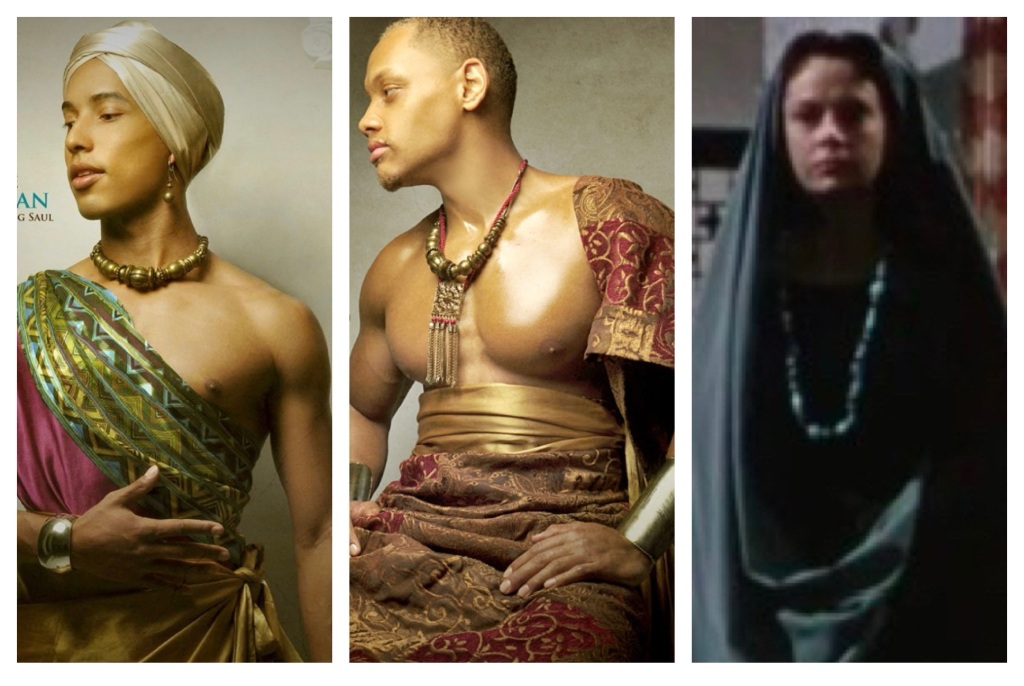
For earlier posts on the David—Jonathan—Saul relationships, see
and

